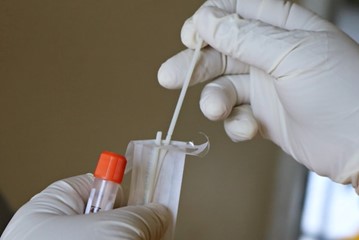Thomas John Raley of Baltimore is a fellowship-trained orthopedic spine surgeon who took an interest in the medical treatments of Covid-19 throughout the pandemic. In the following article, Dr. Thomas Raley discusses medical treatment options for the here-to-stay virus.
Covid-19 hit fast and hard, but it is not some new, or even rare, phenomenon. Since 1900, there have been
8 notable pandemics and pandemic threats. From the Spanish Flu in 1918 that killed an estimated 50 million, to Covid-19, which is still affecting the world today. “The true terror lies in their unpredictability,” explains Thomas John Raley.
It seems like they start from nowhere and spread like wildfire across the planet, leaving a trail of devastation in their wake. This is why it is of vital importance to have testing and treatment options as early as possible.
Testing Options
Thomas John Raley of Baltimore says that there are quite a few different testing mechanisms and different levels of accuracy, but they all fall under two main classifications: Diagnostic tests and antibody tests.
Diagnostic Tests
Dr. Thomas Raley reports that these tests are designed to determine whether a patient is currently infected with SARS-CoV-2, which is the virus that causes Covid-19. These fall into two subgroups as well:
- Molecular tests like polymerase chain reaction test (PCR)
- Antigen tests which check for the presence of the antigens the body creates to fight the infection. These are also referred to as rapid tests.
There are a variety of sample collection methods for testing, with the most common method being the nasal swab (anterior nares). Dr. Thomas Raley says that other collection methods include mid-turbinate, nasopharyngeal, oropharyngeal, and saliva.
Patients can get tested at a doctor’s office, another medical facility, a specialized Covid testing site, or even at home. Dr. Thomas Raley says that there are home-testing kits that will give results, but confirmation by a doctor is recommended, especially if symptoms are present.
It is also beneficial to know that the antibody test, also called a serum test, is not accurate for current infections. These tests are meant to reveal the presence of antibodies that have built up in the blood, a process that takes time. They are also not an accurate determinate for immunity. “Further testing is required before these conclusions can be made,” explains Dr. Thomas Raley of Baltimore.
Reactions and Risks
If a patient tests positive for Covid-19, the most important thing to do is remain calm and seek the advice of a qualified physician who can prescribe a medically accepted treatment. This part is extremely important, as social media and other sources of unqualified advice abound.
While there is no reason to panic, Dr. Thomas Raley says that there is ample reason to begin treatment as soon as possible. If treatment is not started within the first few days of the onset of symptoms, the treatment will either be less effective or not effective at all.
People over the age of 50 are at higher risk of becoming more severely ill, with increasing severity as age increases. Additionally, people who have not been vaccinated, or suffer from certain illnesses, are also at higher risk. The illnesses include chronic lung disease, weak immunity, and diseases of the heart.

 Treatment Options
Antiviral medications
Treatment Options
Antiviral medications have been approved by the FDA to treat mild symptoms of Covid for high-risk individuals. Antivirals are designed to inhibit the spread of the virus within the body, the following treatments are available:
- Nirmatrelvir with Ritonavir (Paxlovid)
- Remdesivir (Veklury)
- Molnupiravir (Lagevrio)
As with any other medication, Dr. Thomas Raley reports that these may have some side effects or may otherwise interact with current medications. Patients should be certain their healthcare provider is aware of any current medications or conditions.
Another approved treatment method is convalescent plasma. This treatment consists of a patient receiving plasma from a donor who has been infected with Covid but recovered. “The plasma has the proper antibodies and can ‘teach’ the recipient how to produce those same antibodies,” explains Dr. Thomas Raley.
Conclusion
Dr. Thomas Raley says that the old saying is still true, “an ounce of prevention is worth a pound of cure”. People who focus their efforts on not getting it in the first place are usually better off. Regardless, it is important to know what to do if symptoms begin to present themselves. Covid is one of those illnesses with a variety of onset symptoms.
It is therefore very important to seek the advice of a professional whenever any symptoms appear, if for no other reason than peace of mind. Knowing is always better than guessing, and guessing at one’s health status is never advisable, especially with a pandemic underway.

 Treatment Options
Antiviral medications have been approved by the FDA to treat mild symptoms of Covid for high-risk individuals. Antivirals are designed to inhibit the spread of the virus within the body, the following treatments are available:
Treatment Options
Antiviral medications have been approved by the FDA to treat mild symptoms of Covid for high-risk individuals. Antivirals are designed to inhibit the spread of the virus within the body, the following treatments are available: